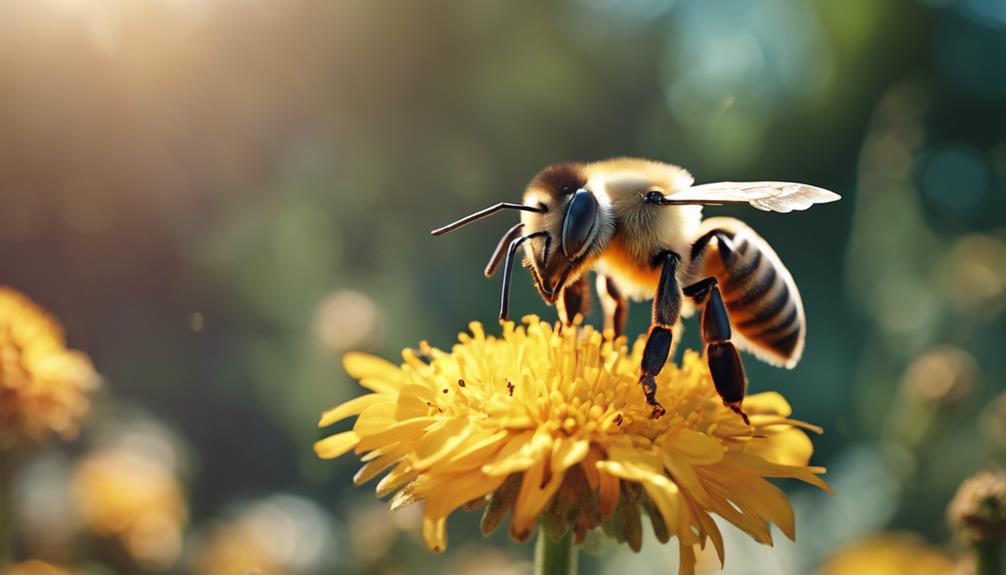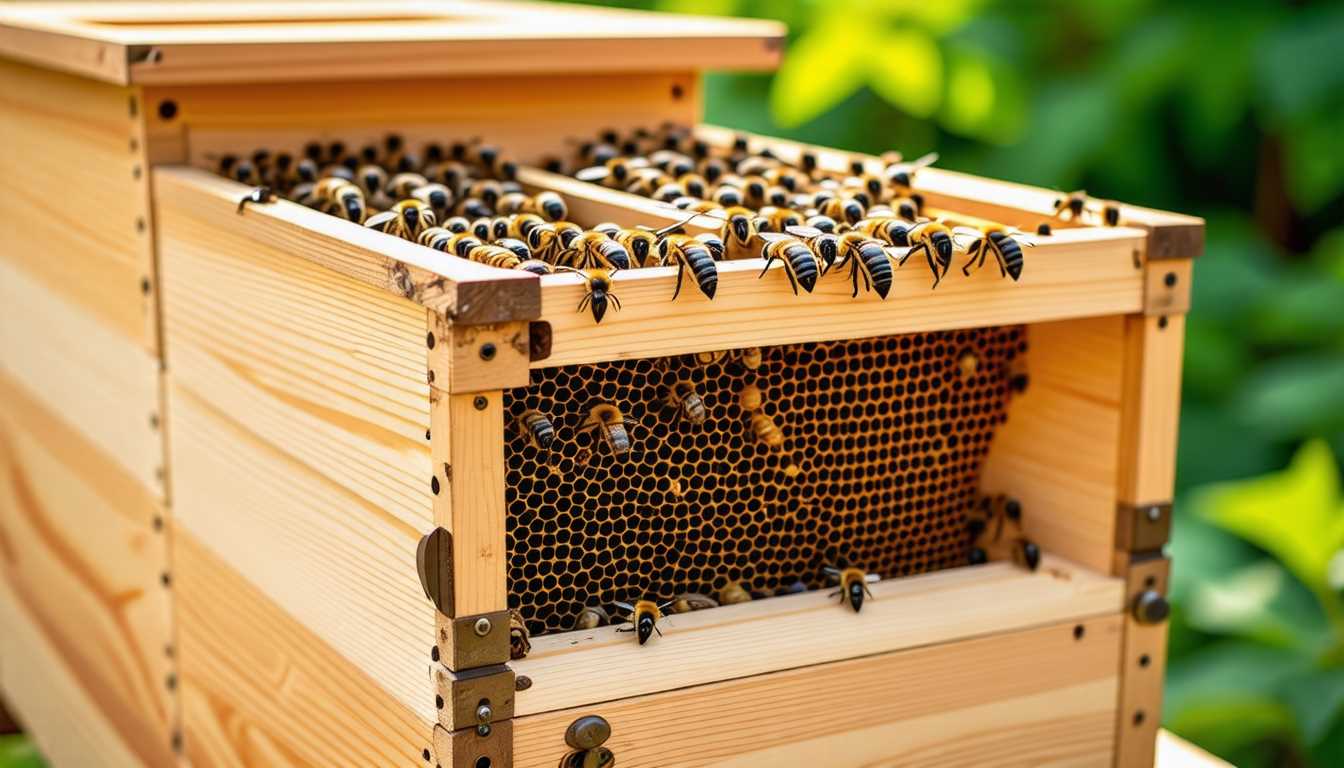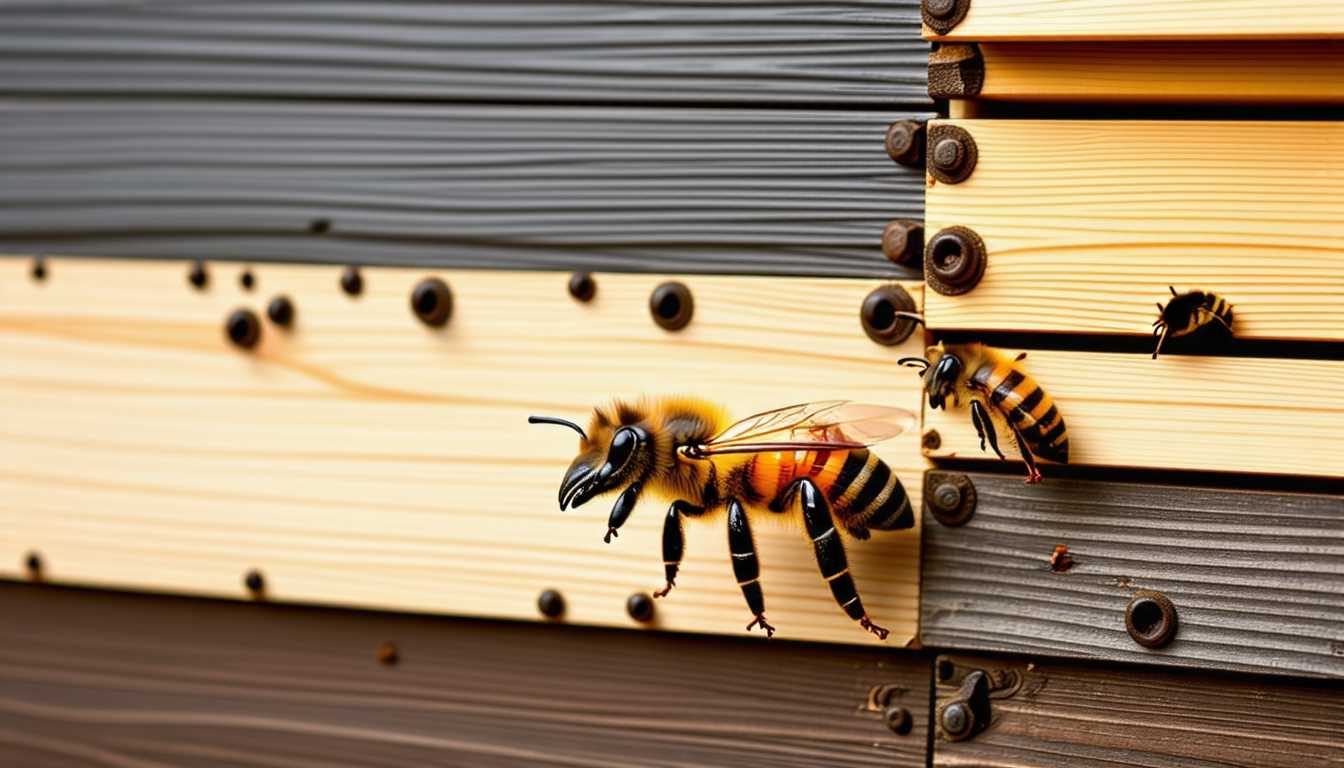When bees make honey, they can face harm from things like aggressive handling, hive gassing, and risks of malnutrition, affecting their well-being and longevity. This can impact their overall health and may raise ethical concerns about the practices involved. Understanding how honey production impacts bees is essential for making informed choices about the honey we consume. There’s more to this fascinating process that sheds light on the intricate relationship between bees and honey production.
Main Points
- Bees can be harmed during honey extraction through stress, injury, and exposure to harmful practices.
- Industrial methods like hive culling and intensive beekeeping compromise bee welfare.
- Clipping queen bee wings disrupts natural behavior and reproductive processes.
- Hive gassing poses ethical concerns and risks bee fatalities.
- Ensuring bee health, diverse nutrition, and disease prevention is crucial for their well-being.
Potential Harm During Honey Extraction
During honey extraction, bees are at risk of injury and stress due to various factors such as aggressive handling and exposure to excessive smoke. The honey production process, while crucial for us to enjoy that sweet golden goodness, can sometimes be tough on our buzzing friends. Imagine being surrounded by smoke or handled roughly when all you’re trying to do is make some honey!
It’s not just about us getting that delicious treat; it’s also about ensuring the bees’ well-being throughout the process. We need to be mindful of how we interact with them during honey extraction to prevent unnecessary harm. By being gentle and using proper techniques, we can help our hardworking bees thrive and continue their essential role in our ecosystem.
Impact of Industrial Practices on Bees
Industrial bee farming practices can have a significant impact on bee health and well-being.
From annual hive culling to feeding bees weak sugar water, these practices can weaken the immune systems of colonies.
Mass-produced honey often involves disruptive methods that compromise bee welfare for the sake of profit.
Industrial Beekeeping Practices
Engaging in intensive beekeeping practices can significantly impact the well-being of bees, disrupting their natural life cycle and compromising their health.
In industrial bee farming, bees are often fed weak sugar water, which can weaken their immune systems and overall health. Another common practice is the clipping of queen bee wings to prevent swarming, causing distress within the colony. These methods, focused on profit rather than bee welfare, harm bee health and well-being.
Annual hive culling and other industrial practices disrupt the delicate balance of the hive, leading to negative consequences for the bees. It’s essential to ponder more sustainable and bee-friendly practices to safeguard the health and vitality of these essential pollinators.
Bee Health Concerns
With the rise of industrial beekeeping practices, concerns regarding bee health have become increasingly prominent due to the harmful impacts these methods have on bee populations. Industrial bee farming practices, such as hive culling and feeding bees weak sugar water, are detrimental to bee health.
For instance, wing clipping on queen bees to prevent swarming in industrial settings causes distress. Additionally, annual hive culling disrupts bee populations and weakens their immune systems. These techniques not only harm individual bees but also contribute to the decline in overall bee populations.
Promoting awareness about these bee health concerns caused by industrial practices is crucial to encourage more sustainable and bee-friendly beekeeping methods that prioritize the well-being of these essential pollinators.
Consequences of Wing Clipping
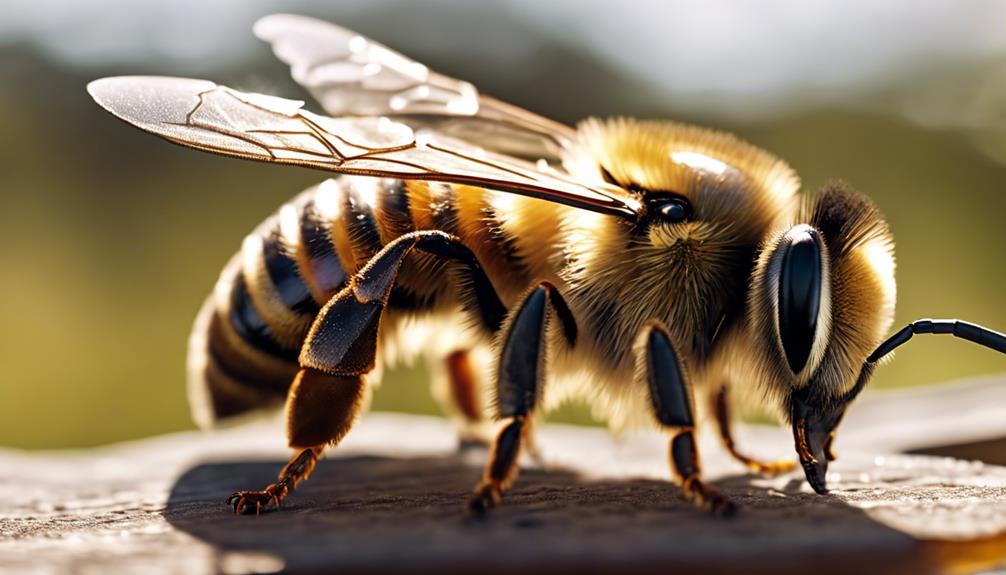
Clipping the queen bee’s wings disrupts the natural swarming process and hinders the colony’s ability to reproduce and establish new colonies. Here are the consequences of wing clipping in bee colonies:
- Limiting Natural Behavior: Wing clipping restricts the queen bee’s flight, affecting her control over the hive and disrupting the colony’s natural processes.
- Increased Stress: Bees with clipped wings may experience stress due to their inability to perform essential behaviors effectively.
- Industrial Bee Farming: This practice is commonly used in honey farming to manage hive populations and prevent swarming, impacting the bees’ freedom and natural instincts.
Effects of Hive Gassing
Gassing hives in the honey industry is a common practice that raises ethical concerns regarding bee welfare and humane treatment due to the potential harm and distress it causes to the colony. Honey bees are crucial for our ecosystem, and hive gassing can have negative effects on their well-being.
The use of fumigants like cyanide or sulfur dioxide in hive gassing can lead to bee fatalities, impacting the overall health of the colony. While beekeepers resort to hive gassing to make honey extraction easier, it’s important to take into account the impact on bee welfare. This controversial method sparks debates about finding more bee-friendly alternatives that prioritize the health and safety of these essential pollinators.
Bee welfare should be a top priority in the honey industry to guarantee sustainable practices.
Risks of Malnutrition in Bees
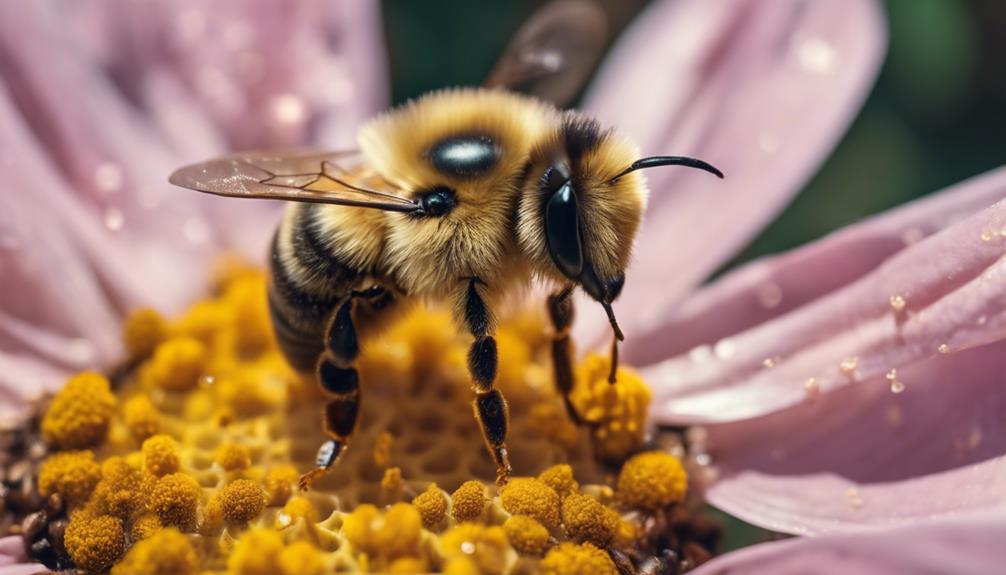
Hey there!
Did you know that bees can face serious risks of malnutrition if we harvest their honey excessively?
This can weaken our immune systems and leave us more vulnerable to diseases.
It’s important for responsible beekeepers to make sure we’ve enough honey reserves to keep us healthy and thriving.
Bee Malnutrition Risks
Bee malnutrition risks pose a significant threat to the health and longevity of bee populations when they’re fed weak sugar water instead of nutrient-rich nectar. Here are three key points to ponder:
- Essential Immune Systems: Inadequate nutrition can weaken bees’ immune systems, leaving them more vulnerable to diseases that can devastate entire colonies.
- Challenges in Foraging: Malnourished bees may find it difficult to forage for food, affecting their ability to sustain the hive and care for their young.
- Population Decline: Colonies with malnourished bees may experience declines in population and increased mortality rates, impacting the overall health of the bee community.
It’s vital to provide bees with a diverse and nutritious diet to prevent these malnutrition risks and support their well-being.
Impact on Bee Health
Malnutrition in bees poses a significant threat to their overall health and longevity, impacting their immune system and leaving them more vulnerable to diseases. When beekeepers harvest excess honey, it can lead to bees lacking essential nutrients crucial for their well-being.
Bees rely on honey for sustenance, and inadequate nutrition due to honey removal can have detrimental effects on their health. A weakened immune system from malnutrition makes bees more susceptible to various illnesses, jeopardizing the entire colony.
Responsible beekeeping practices prioritize ensuring bees have enough honey for their health and vitality. It’s essential to strike a balance between honey production and bee health to maintain a thriving and resilient bee population.
Honey Production Effects
When considering the impact of honey production on bees, it becomes evident that excessive harvesting can result in significant risks of malnutrition for these essential pollinators. Here’s why this is important:
- Bees can suffer malnutrition when beekeepers harvest excessive honey, depriving them of necessary nutrients.
- Honey production can lead to bees consuming substitute sugars, causing malnutrition and health issues.
- Loss of floral diversity from intensive honey production can impact bees’ nutrition and overall health.
It’s vital to balance honey production with the well-being of our bee populations. Sustainable beekeeping practices prioritize leaving enough honey for bees to prevent malnutrition and support colony health. Let’s make sure our buzzing friends have the nutrition they need to thrive.
Diseases in Honeybee Populations
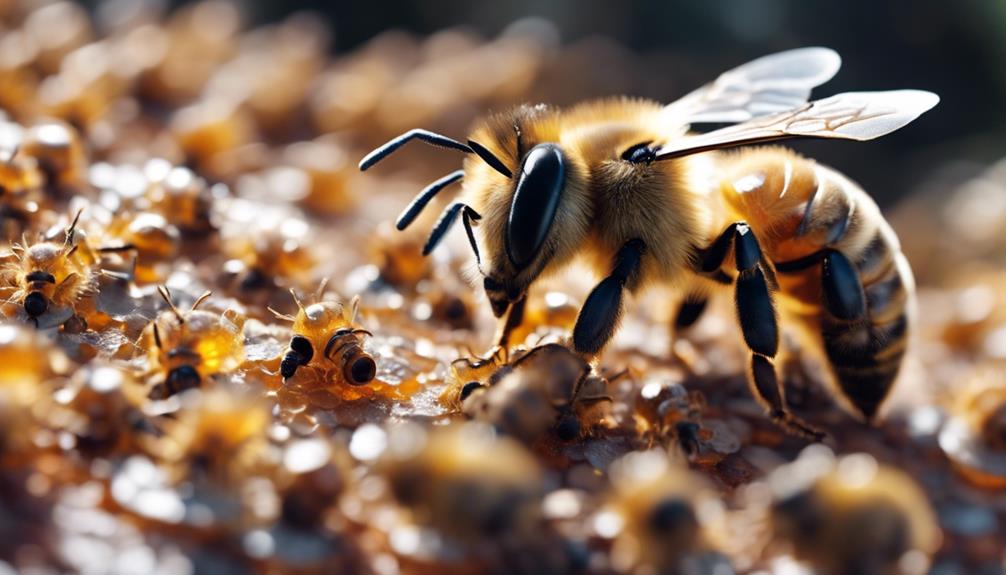
Monitoring and controlling diseases within honeybee populations is essential for maintaining colony health and ensuring the quality of honey produced. Diseases like American foulbrood and varroa mites pose significant threats to bee health and honey production worldwide.
Varroa mites, in particular, weaken bees’ immune systems and spread harmful viruses, while American foulbrood targets bee larvae, risking entire hive destruction if not managed effectively. Beekeepers play a vital role in combating these diseases, actively monitoring and implementing control measures to safeguard their colonies.
Understanding disease prevention and treatment is key for beekeepers to protect their hives and preserve the high standards of honey they produce. By staying vigilant and informed, beekeepers can help mitigate the impact of diseases on honeybee populations and maintain a healthy environment for honey production.
Substitutes and Bee Health
Exploring the impact of substitutes on bee health reveals the vital role of proper nutrition in maintaining thriving colonies. When it pertains to bee health, the queen bee’s well-being is paramount. Here are three key points to ponder:
- Commercial honey substitutes, such as sugar syrups, often lack essential nutrients necessary for bees’ health.
- Feeding bees inadequate substitutes can weaken their immune systems and lead to malnutrition, impacting the overall health of the colony.
- Bees require a varied diet, including nectar and pollen, to stay healthy and vibrant. Providing them with natural food sources is essential for their well-being and the production of high-quality honey. Remember, a healthy queen bee means a healthy colony!
Promoting Sustainable Beekeeping Practices
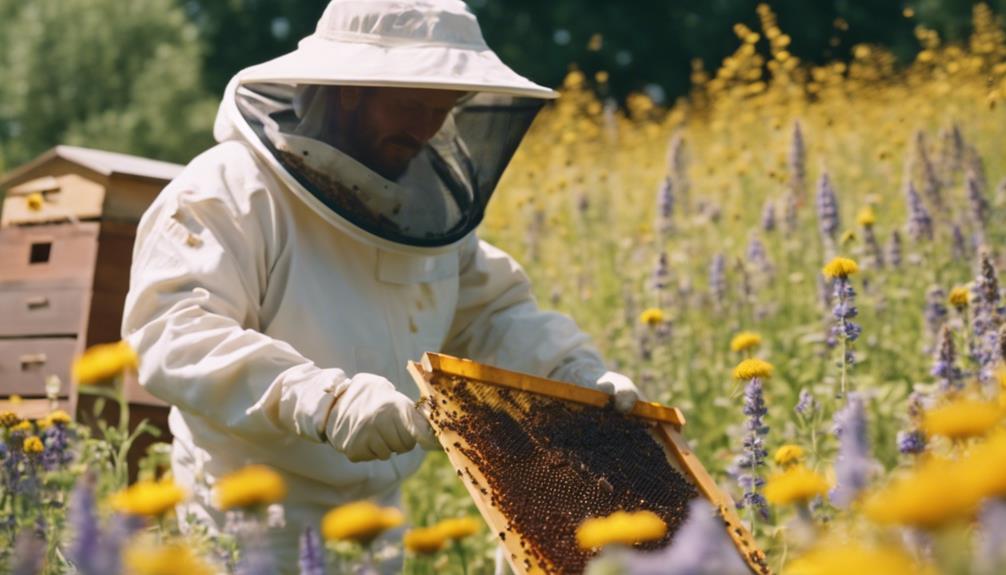
To guarantee the sustainability of beekeeping practices, emphasizing bee welfare and environmental conservation is essential. Sustainable beekeeping means prioritizing the well-being of bees and the protection of our precious ecosystems. Responsible beekeepers play a significant role in ensuring the health and happiness of bee colonies, leading to sustainable honey production.
By adopting ethical beekeeping methods, beekeepers promote natural bee behavior while minimizing unnecessary human intervention. Supporting local beekeepers who follow sustainable practices not only helps safeguard bee populations but also contributes to the preservation of critical ecosystems. When consumers choose honey from bee-friendly sources, they actively participate in promoting ethical beekeeping practices and environmental conservation.
Together, we can work towards a future where bees thrive, and sustainable beekeeping practices prevail.

Hello! My name is Noel Calvin. I graduated from UCLA and now work as a writer at Launch Ninjas. I write blog posts that inspire and guide our readers in their entrepreneurial pursuits. I live in Pleasantville, NJ, with a peaceful yet lively atmosphere that inspires me.
Writing stories is more than just a job for me. It allows me to share my observations and satisfy my curiosity about the world. I combine my analytical skills with creative enthusiasm to delve into technology trends and startup stories. But my life isn’t limited to screens and keyboards. I value loyalty, passion, and a touch of old-fashioned charm, which I infuse into every narrative I create.
I love spending time in my garage, jamming with my band when I’m not writing. Playing the guitar and singing bring me immense joy. I also enjoy capturing ordinary and extraordinary moments through my camera lens and exploring new culinary adventures that excite my taste buds. I’m always seeking new experiences.
My family is very important to me. Joyful Sunday brunches filled with laughter and intense board game nights keep me grounded, reminding me of life’s simple pleasures.
In my world, every moment is an opportunity for discovery. Every discovery is a story worth sharing, whether a heartfelt moment at home or the pulse of technological innovations. Join me as I navigate through life, one blog post, one guitar strum, and one heartwarming family dinner at a time.
